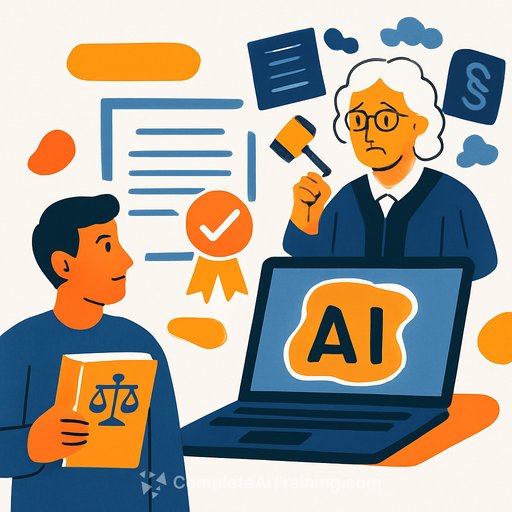Another Law School Makes AI Certification Mandatory for 1Ls
Caselaw hallucinations and AI misfires keep making headlines. Even seasoned litigators get burned. The signal is clear: legal education must train lawyers to spot and manage AI risk, not avoid it.
Mississippi College School of Law will now require an AI certification for first-year students, joining Case Western Reserve University School of Law. The move shifts AI literacy from "nice to have" to baseline competence.
Inside MC Law's Certification
MC Law's new Introduction to AI and the Law certification, developed with Wickard.ai and founder/CEO Oliver Roberts, blends foundation, practice, and ethics. The curriculum is structured and outcome-focused.
- Session 1: Core concepts of AI and large language models (LLMs).
- Session 2: Best practices for prompting, validation, and error-checking.
- Session 3: Ethical use across research, drafting, and client service.
- Session 4: Overview of federal and state AI regulations.
The course ends with an assessment. Passing students receive an AI legal practice certification.
"MC Law is looking to take the lead in preparing the twenty-first-century lawyer for the effective and ethical use of AI to better serve their clients and communities," said Dean John Anderson. "The goal is to maximize the benefits of these transformational technologies for our state and nation while minimizing the risks."
Why It Matters for Legal Professionals
- Risk control: Structured training reduces hallucinations, citation errors, and confidentiality breaches.
- Efficiency with guardrails: Faster research and drafting, paired with rigorous validation.
- Client expectations: Corporate clients increasingly ask for AI policies and controls.
- Regulatory readiness: Teams need a working grasp of evolving state and federal rules.
What Law Schools and Firms Can Do Now
- Adopt an AI use policy that covers data security, disclosure, and human review.
- Set a minimum training standard for students, clerks, and associates; certify it.
- Build matter-specific workflows: research, drafting, and QA steps with checkpoint reviews.
- Run drills: spot-the-hallucination exercises and cite-checking against trusted databases.
- Track developments in state and federal AI regulation and update policies quarterly.
What to Watch Next
Two schools making certification mandatory suggests a trend. Expect more law schools-and bar associations-to formalize AI competence as a professional standard.
Resources
Which school is next to make AI training non-negotiable? The sooner students and junior lawyers build these skills, the fewer AI-driven mistakes will end up on the docket.
Your membership also unlocks:






